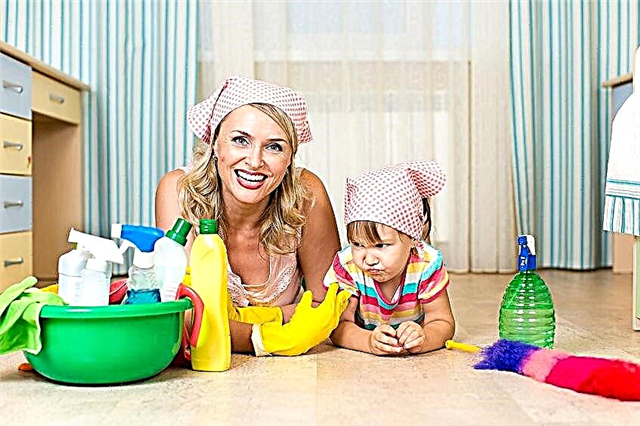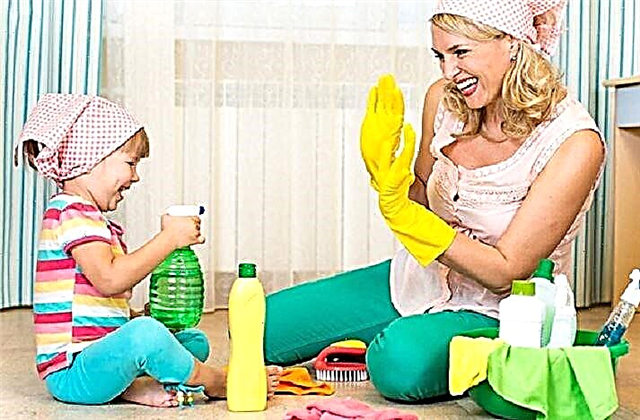Child's work at home as a way to educate a full-fledged and independent personality. How to talk to a child correctly, what should not be offered to him and what should be focused on.
Many parents often shield their children from household chores. Is it correct? Will a child be able to appreciate someone else's work if he does not make a little effort, doing something around the house? After all, household chores form in a person a sense of responsibility and care for the people around him.

Parents often, in their desire to fully develop their child, enroll him in foreign language courses, in art circles, in sports sections. But they are not instructed to do housework, because they do not consider it necessary or deliberately save them from everyday difficulties. As a result, the situation reaches a level where it will be completely useless to convince children to clean up at least their own room.
Study. According to research by sociologists, 82% of the surveyed adults in Russia did housework when they were little. But only 28% are ready to entrust such work to their children. Parents prefer to load their child with activities that guarantee them success in their future career, but do not burden them with household responsibilities. However, it has long been known that housework not only makes a child more organized in life, but also has a positive effect on the psyche and academic success.
By transferring certain household responsibilities to children, adults contribute to the appearance of greater self-confidence and independence in them. Studies have shown that kids who help their parents from 4-5 years old were more sociable, made friends quickly, and did well in school and university. Their peers, not burdened with household responsibilities at an early age, who began helping around the house from adolescence, did not climb the career ladder so quickly.
Helping the family, children learn to be more responsive, understanding, kind, to help others, to take care of their relatives. If children give up household chores on the pretext of being too busy at school, they should not be completely relieved of household chores. Allowing a child to abandon household chores, parents unwittingly form a certain attitude in them: grades at school are more important than attention to the family. Now this may seem like a small thing, but over time you will see your mistake.

You can motivate and direct your child to household chores based on the following recommendations:
- Be attentive to your words. According to psychologists, gratitude to children should be expressed in a non-formal phrase, for example, “thank you for your help” (it will not be enough). Thank the child by calling him a good helper: "you are such a good helper." He will not only have a desire to do something around the house again, but his self-esteem will also increase, he will feel that without him it will be really harder for the family to cope, he is useful and important for his family.
- Remember the routine. When scheduling your child's classes - lessons, music, language courses, sports, recreation - add household chores to it. So he will feel their importance and will develop a responsible attitude towards them. And this is how you teach your child to discipline.
- Game tasks will not interfere. You can try to develop a whole quest system for household chores. Performing each of them in a row, he will sequentially move on to more complex ones. For example, dust off the table, sweep in the living room, then a more interesting task is to turn on the washing machine :).
- Monetary rewards should not be applied. According to psychologists, material incentives impair the child's motivation. He will already consider his help from a mercantile point of view - without a desire to help parents, but only in order to get money for it. We also read: Children and money: 10 mistakes of financial education.
- The occupation that you give your child is of great importance.In order not to bring up an egoist, it is worth choosing activities for the child that will be necessary for the whole family, and not only for him. Along with putting things in order in your room, you can instruct him to wash the dishes and dust in the living room.
- The order tone is out of the question. It is better to soften the imperative mood in the conversation - do not "take away", but "let's take it away." It is important to focus on the fact that this is not a boring and difficult task, but an opportunity to take care of relatives.
- A positive coloring for household chores. You should not entrust any homework to your child as a punishment. Talk about homework in a positive or neutral way. By constantly repeating words about how hard it is to cope with household chores - how tired you are of washing floors or vacuuming - you will set an example for your child to take into account. And then he won't like doing it either. Better to focus on caring for the home and keeping it clean for the comfort of all family members.
- We teach a child to be in order, or how to raise an assistant
- 40 basic things that a child should be able to do around the house at the age of 2-13
- 9 simple tips to teach your child to help around the house
- Household chores that can be entrusted to a two-year-old child
- How to raise responsibility in a child
At what age should a child be taught to help around the house?



